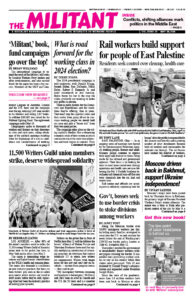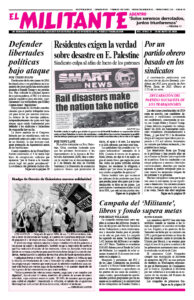DAG TIRSÉN
AND PAMELA HOLMES
LONDON — Thousands of nurses and other health workers took part in a one-day work stoppage at half the hospitals across England May 1, in a long-running dispute with the government over pay and conditions. The work stoppage was called by the Royal College of Nursing, the largest nurses’ union in England. They are demanding a pay increase 5% above the official inflation rate, which is currently over 10% a year.
In April union members voted down the union leadership’s recommendation that they accept the government’s offer of a 5% pay rise at the National Health Service. Members of Unite, which organizes ambulance drivers and other health care workers, rejected it as well. Unison, which also organizes nurses, and two other unions, accepted the offer.
On the picket line at Guy’s and St. Thomas’ Hospital here many strikers held homemade signs and placards. One read, “Too important to strike + Not important enough to pay fairly = Nursing.”
The nurses were adamant that their fight is not mainly over pay but over conditions, especially the understaffing of hospitals.
Nurse Helen Guyatt, a member of the Royal College of Nursing, told the Militant, “The strike is not only about money but how nurses and other staff at the hospitals are treated. After three years of the pandemic we were labeled as heroes, but now we are worth nothing.” She was outraged that the London High Court had outlawed a second planned strike day because of a technicality.
Rebecca, a pharmacist and member of the Unite union who did not want to use her last name, said for her it’s “mainly about the working conditions — people leave and others have to cover their work because recruitment is slow in order to save money. There are dangers of mistakes when we are overworked, which can kill people if we give them the wrong drugs or dosage.”

